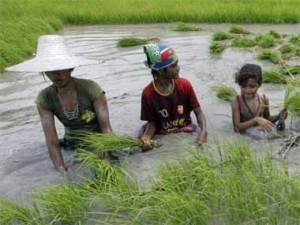We’ve all known, in varying degrees though, that climate change is impacting crop production; but by how much is not precisely known. It appears climate change has been responsible for 6 percent change in food prices over the last 30 years. Looking at historical and publicly available data since 1980, researchers from a bunch of US universities report in today’s Science that rising temperatures since 1980 have reduced the global yield of wheat and corn by 5.5 and 3.8 percent respectively. India and Russia are reported to have lost 6 percent and 15 percent in wheat production. Two other widely grown crops, rice and soy, have not been much impacted though. Here again, Indonesia and India have been affected by 3 to 5 percent reduction in output [caption id=“attachment_5057” align=“alignright” width=“300” caption=“Rice and Wheat production are affected by climate change. (Lirio Da Fonseca/Reuters) “]
 [/caption] In all these years, there is no global trend in precipitation – there are as many areas getting drier as there are areas getting wetter. But when it comes to temperature, several places have experienced serious changes and that covers 65 percent of rice and maize growing countries and 75 percent of wheat growing countries. America, for one, remains somewhat immune with little or no temperature change. The study however did not take into account the direct effects of elevated carbon dioxide, technological interventions in farming, improved seed varieties, et al. So, while researchers are saying that “climate change is not the predominant driver of crop production” they want to emphasize that over long periods of time it “modifies” crop production. And the key here is adaptation on the part of the farmers and the governments. For instance, Russia could be a gainer if it moved to different farming locations. Where will Indian farmers, already with small land holdings, move? The biggest positive from this study is the awareness that periodic assessments of climate trends that are affecting global food production, are needed to provide some insight for policy makers. The governments should pay attention to adaptation processes; scientists should study the pace of responses, particularly for wheat and maize.
[/caption] In all these years, there is no global trend in precipitation – there are as many areas getting drier as there are areas getting wetter. But when it comes to temperature, several places have experienced serious changes and that covers 65 percent of rice and maize growing countries and 75 percent of wheat growing countries. America, for one, remains somewhat immune with little or no temperature change. The study however did not take into account the direct effects of elevated carbon dioxide, technological interventions in farming, improved seed varieties, et al. So, while researchers are saying that “climate change is not the predominant driver of crop production” they want to emphasize that over long periods of time it “modifies” crop production. And the key here is adaptation on the part of the farmers and the governments. For instance, Russia could be a gainer if it moved to different farming locations. Where will Indian farmers, already with small land holdings, move? The biggest positive from this study is the awareness that periodic assessments of climate trends that are affecting global food production, are needed to provide some insight for policy makers. The governments should pay attention to adaptation processes; scientists should study the pace of responses, particularly for wheat and maize.
From her perch in Bangalore as a Senior Editor at Forbes India, Seema usually writes about science and technology. She believes that while we may have settled into consuming the nicely packaged final products of science -- technology being a hand maiden of science -- we are distancing ourselves from all the effort that goes into it. This blog is an attempt to bring an occasional peek into those efforts and ideas.
)